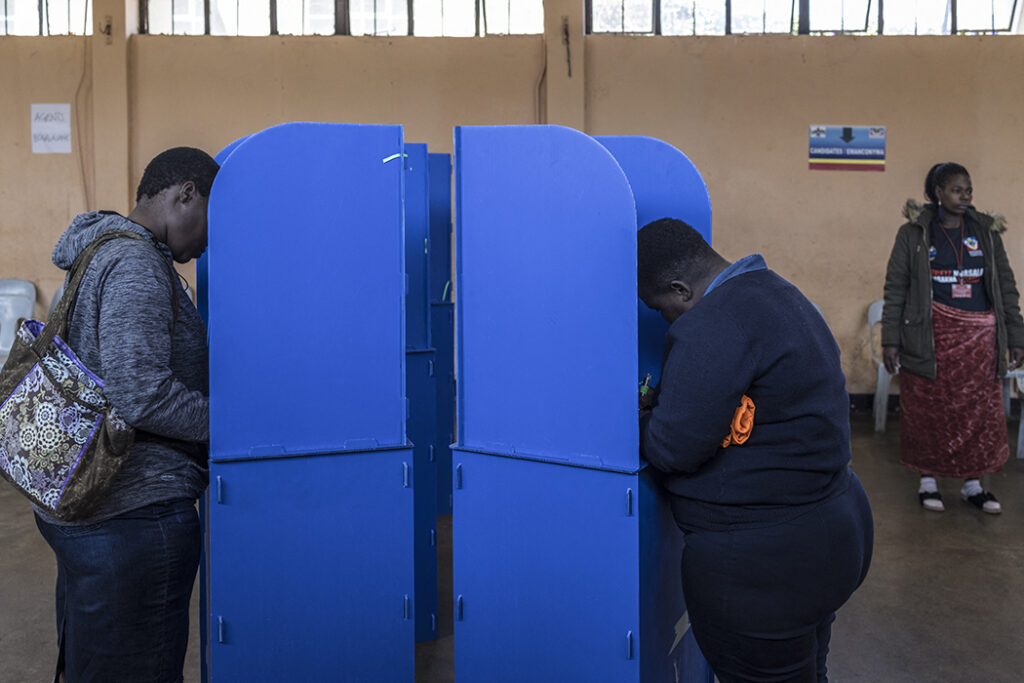By Dr Craig Moffat and Dr Mokete wa Mokete
Eswatini holds its 2023 general elections on 29 September. Unlike in other elections in different political settings, this vote is unlikely to drastically change the political landscape in the country that has been ruled by King Mswati III since 1986. Eswatini is the last absolute monarchy in Africa, where Mswati wields absolute power, political parties are banned, and lawmakers contradicting the king are side-lined. As the country gears up for election day, one must ask if these elections are worth contesting or if it is simply a political ploy for Mswati to exhibit some façade of providing the citizens with limited democratic rights?

Members (MPs) elected to the House of Assembly are elected from Tinkhundla, which also serve as constituencies for the purposes of electing MPs. The election will produce 59 Tinkundla (constituency) ballots for seats in the House of Assembly, including 10 lawmakers Mswati appoints directly. In addition, he also selects 20 of the 30 senators in the Senate. The rest are elected by the House of Assembly. King Mswati III has the prerogative to veto any legislation and appoint the Prime Minister and Cabinet. Therefore, being in the good graces of the King is beneficial to any candidate’s political aspirations.
Candidates cannot be affiliated to any political group, rather under the constitution it emphasises “individual merit” as the basis for selecting members of parliament and public officials. According to the Elections and Boundaries Commission (EBC) there are about 585,000 registered voters eligible to cast their vote on election day. The polling stations opened at 7am and will close at 6pm. There are 664 polling stations in all four regions throughout the country.
Previous Election Concerns
In 1973 a decree was passed banning political parties. During the 2018 election, both the African Union Election Observer Mission (AUEOM) and the SADC Electoral Observation Mission (SEOM) raised concerns over this issue:
- AUEOM encouraged the government to consider reviewing the decree and allowing for freedom of association in accordance with the 2005 Constitution. While political parties were effectively banned in 1973, a new constitution in 2005, offered a provision for freedom of association.
- SEOM stated: “The Tinkundla system appears to be non-compliant with s25 of the Constitution of Eswatini and is contrary to the Revised SADC Guidelines and Principles Governing Democratic Elections (2021), particularly s4 with respect to the right to freedom of association”.
These concerns are important because they do acknowledge the principle of SADC Member States having their individual national and cultural sensitivities respected but also recognise the barring of political parties from the electoral and political processes. The Tinkundla system does contravene both the country’s Constitution and the Revised SADC Guidelines and Principles Governing Democratic Elections (2021).
Despite the government’s persistent non-compliance, several pro-democracy organisations and trade unions continue lobbying for political reforms and publicly challenging King Mswati III’s rule despite the risks involved. The government has used increasingly repressive tactics to stifle rising pro-democracy activism in recent years; those calling for political reform often face arbitrary arrests, harassment and the use of unlawful force by security forces.
Earlier this year, the SADC Electoral Advisory Council (SEAC) undertook a Goodwill Mission to Eswatini from 31 May to 9 June 2023 to assess the readiness of the country to hold elections. The objective of the Mission was to assess:
- The political and security environment in the country was conducive to the holding of free and peaceful elections.
- The legal framework governing the 2023 General Elections is in place.
- The EBC is ready and prepared to conduct democratic elections.
- Ways of supporting the government and the people of Eswatini to find peaceful and sustainable solutions to the national political and security crisis.
After consultations with various stakeholders, SEAC was in a difficult position. The members wanted to advise the Ministerial Committee of the Organ that Eswatini was not ready to conduct elections in a free, credible and peaceful manner. Their findings and observations can be traced to the Tinkundla system and the views of pro-democracy groups which identified the following:
- Lack of freedom of association, particularly with respect to the ban on political parties.
- Lack of freedom of expression, particularly with respect to the articulation of political choices and organised political formations.
- The potential for the eruption of violence before, during and after the elections is because of the unresolved conflict arising from the 2021 unrest.
- Lack of tangible progress in the implementation of the national dialogue that may allow for a national healing process and diffusion of the political and security tensions in the country ahead of the elections.
Emanating from the findings and observations, SEAC then recommended the following:
- Urged the government to seriously put in place urgent measures to initiate the national political dialogue process as proposed by the SADC Organ Troika and endorsed by the SADC Summit.
- Urged the government to hold a national dialogue with all interested parties before the general elections were held, considering that the call for a national dialogue has been on the SADC agenda since 2018.
- Eswatini did not meet the criteria to hold an election as stipulated in the Revised SADC Guidelines and Principles Governing Democratic Elections (2021).
What emerged from the SEAC recommendations is puzzling. The then Chair of the Organ, President Hage Geingob from Namibia, was advised not to deploy SEOM. However, in practice it may not have been as simple a process. SEAC was uncompromising in its recommendations, as Eswatini had not demonstrated any efforts to implement earlier SADC recommendations. However, despite SEAC recommendations, Eswatini invited SEOM to observe the elections. If President Geingob had heeded SEAC’s advice, it may have led to the much-desired positive effects of steering Eswatini along a path towards more democratic reforms rather than repeating an election process with an outcome that yields little opportunity for democratic change.
Way Forward
Since several opposition groupings have called for an election boycott, it will be interesting to see if the call is heeded as a show of solidarity against the rule and the election process, benefitting more King Mswati III than the democratic rights of the electorate. Unlike in other political settings gearing up for an election cycle, in Eswatini there were few, if any, political gatherings in the period leading up to the election. This lack of political rallying deprives the electorate of an important facet of the democratic process: political choice. Again, unlike in other political settings about to go to the polls, the election results are expected sometime over the weekend, but the anticipation levels are much lower as this vote, unfortunately, is unlikely to drastically change the political landscape in the country and bring democratic reform.
Dr Mokete wa Mokete – Independent Political Researcher

Dr Craig Moffat served as an analyst at the SADC Early Warning Centre during his tenure with the South African Foreign Service. He was also a Senior Research Fellow in the Research Group on Peace, Conflict, and Development at the Norwegian Institute of International Affairs. Prior to that, he was the Head of the Programme for Governance Delivery and Impact at Good Governance Africa. Dr Moffat holds a PhD in Political Science from Stellenbosch University.


